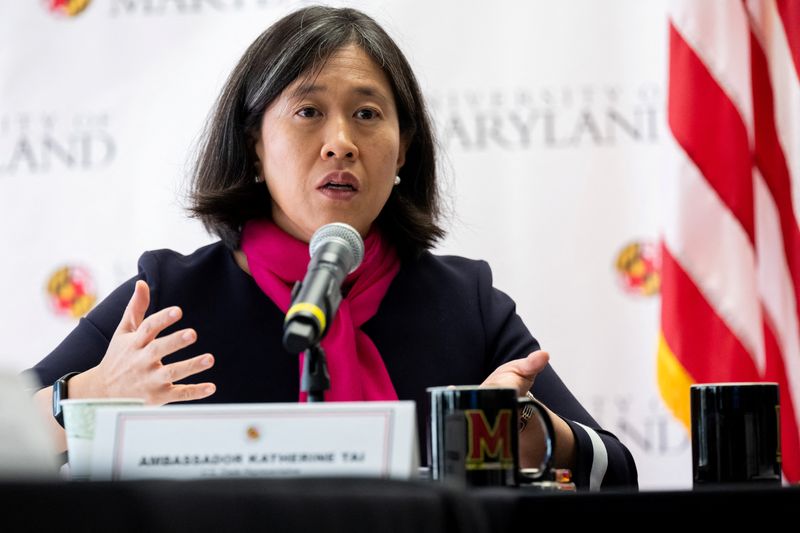By David Lawder
WASHINGTON (Reuters) -U.S. Trade Representative Katherine Tai on Wednesday defended the Biden administration's decision not to pursue traditional free trade deals and argued her approach of working to ease non-tariff barriers is better for workers, supply chains and the U.S. ability to compete with China.
In a policy speech at American University's Washington College of Law, Tai said she is starting to change minds in Washington and in other capitals that the traditional approach of cutting tariffs no longer works in the highly competitive global economy of the 21st century.
"We are writing a new story on trade, one that makes us more resilient, our economy more sustainable, and our results more inclusive," Tai said.
Trade needs to work hand-in-hand with industrial policy, Tai said, which the U.S. is employing to invest in infrastructure, semiconductors and clean energy technology. These incentives are resulting in good paying jobs, including for those without a college degree, Tai said.
She said past trade deals focused on "aggressive liberalization and tariff elimination" made the U.S. and other countries too dependent on China for critical materials. They also allowed Beijing to use state-led non-market practices to dominate key global industries, she added.
The Biden administration's approach must address China's "economic mercantilism" by making strategic investments at home to better compete and "strengthening our cooperation with like-minded economies to forge a fairer and more sustainable future for our people," Tai added.
That approach, she said, is the foundation for trade engagements such as the Indo-Pacific Economic Framework (IPEF) and the U.S.-EU Trade and Technology Council. They will focus not on tariffs but on regulatory, environmental, food safety, labor and digital economy issues that have proven to be formidable trade barriers.
FALLING BEHIND?
Her remarks come amid growing calls from U.S. business and agricultural trade groups for Congress to approve new "fast track" negotiating authority for USTR to pursue traditional free trade deals.
These groups argue the U.S. is falling behind the growing network of free trade deals forged by China and the European Union in recent years, putting U.S. farmers and food companies at a disadvantage against many foreign competitors in key markets.
Republicans in the U.S. Senate and House of Representatives also pelted Tai with complaints about the lack of new tariff-reducing trade deals during hearings last month.
"We lose ground every day that we remain on the sidelines in real trade negotiations," Republican Senator Mike Crapo of Idaho said during a Senate Finance Committee hearing, urging the administration to reconsider decisions not to pursue market access in IPEF or other trade arrangements.
Tai argued that the USTR's non-tariff negotiations were enabling U.S. rice, wheat, corn, shellfish, and beef exports to the European Union, pork and pecan exports to India, and beef and ethanol exports to Japan.
U.S. agricultural exports reached $202 billion last year, which Tai attributed in part to USTR's efforts, although higher commodity prices prompted by Russia's war in Ukraine played a role.
Tai told reporters it has been difficult to explain the need to break away from the traditional vision of ever-liberalizing trade deals.
But the message was starting to sink in, partly due to widespread recognition that supply chains need to be made more resilient after the COVID-19 pandemic and the desire to reduce dependence on China, she said.
"We are nearing a consensus on the need to do things differently."
